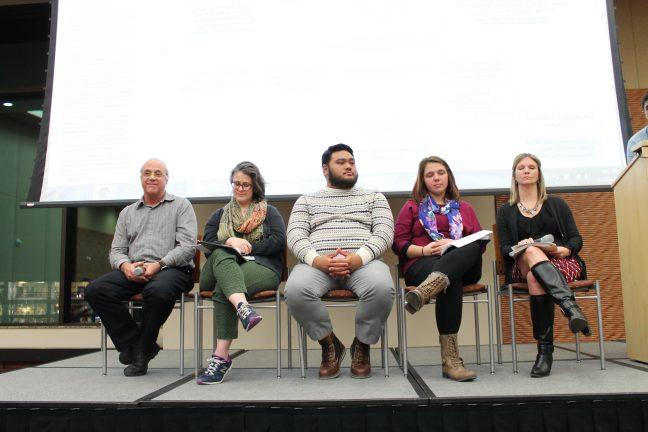Combating sexual assault on campus and beyond will mean normalizing consent and fostering an open dialogue, at least according to a panel of University of Wisconsin officials and victim advocates.
The UW Homecoming Committee and We’re Better Than That-Men Against Sexual Assault hosted the panel Tuesday evening, which featured two sessions of pre-established questions and a Q&A portion with the audience.
Beginning the panel with defining sexual assault and consent, panelists acknowledged that in a college setting, these two terms may come with a lot of ambiguity.
When alcohol is involved, getting a “yes” becomes “tricky,” said Tonya Schmidt, UW Student Conduct and Community Standards director, who investigates sexual assault reports.
“People struggle with knowing whether they’re incapacitated or not,” Schmidt said. “If you are considering sexual contact and intercourse [with someone,] you need to have been with them the entire night to be able to properly assess the situation.”
In any situation, Cassie Schroeder, UW senior and chair of Promoting Awareness, Victim Empowerment, considers consent to be ongoing, continuous and informed.
While the panelists all agreed consent is an absolute necessity in any situation, Carmen Juniper Neimeko, a representative from End Violence On Campus, said society needs to change the way we think about consent.
Instead of looking at consent from a rigorous, legalistic perspective, Neimeko said society must think of it as a moral framework.
“We need to consider making [consent] a societal norm where you’re honoring someone’s agency and body,” Neimeko said. “We need to move out of this ‘black and white, right and wrong’ perspective and shift thinking around consent as a normativity as increasing pleasure instead of not doing something wrong.”
By moving toward this perspective, Neimeko said society will be able to move into a world of mutual respect and accountability.
In normalizing consent, Neimeko also believes it will make people who are more coercive more visible, and in turn, make this problematic behavior less normative.
In the same vein, talking openly about consent is important in understanding ones’ desires and boundaries, Gabe Javier, LGBT Campus Center director, said.
“Being able to say ‘this is my body and these are my boundaries I’m setting’ is really important, whether it be a sexual, romantic or even online relationship,” Javier said.
Having open communication with a romantic partner and others is important in fostering a healthy dialogue about sex, Schmidt said.
But there are a few factors that hinder this open discussion.
Hookup culture poses a challenge to understanding the framework of consent, especially when alcohol is involved, Schroeder said. While Schroeder acknowledged there can be healthy hookups, she said these type of interactions rarely have an open dialogue.
Building off that, Schmidt added that in today’s age, society doesn’t talk about healthy relationships often enough. As sex might be a part of a relationship, she said it’s good to openly communicate about expectations.
“If we help kids back in elementary school, we can stop the silence and make it more normal to have these conversations about what we want out of relationships,” Schmidt said.
Along with hookup culture, Javier said rape culture and toxic masculinity plays into our inability to openly discuss sexual assault, and promotes a lot of silence around reporting.
Specifically within the LGBTQ+ community and for people of color, other messages, such as the value and ownership of bodies, contribute to rape culture, Javier added.
“Identities and relationships [of LGBT and people of color] are oversexualized or often seen as abnormal or sick,” Javier said. “In a perpetrator’s mind, this can lead to violence.”
Despite some of the setbacks in openly discussing sexual relationships and the issue of sexual assault, there have been some improvements in dealing with sexual assault on campus, particularly with the reporting process.
How the University of Wisconsin investigates sexual assaults
In 2015, Schmidt said there were 217 cases reported to the Office of Student Conduct and Community Standards. As of Nov. 29, the office has received 274 cases, she added.
This jump in cases doesn’t mean more sexual assaults are occurring, Schmit said. Rather, it means more people are choosing to report.
“People are feeling more comfortable with reporting,” Schmidt said. “The stigmas and fears [of reporting] are lessening.”


